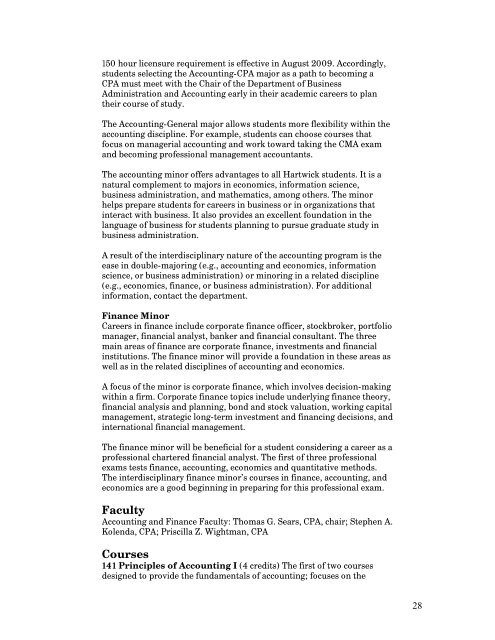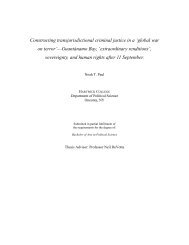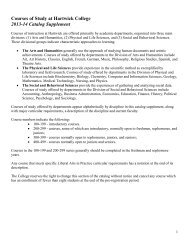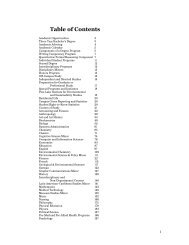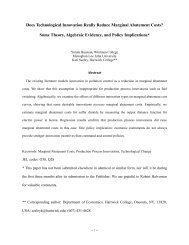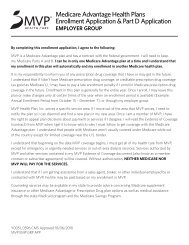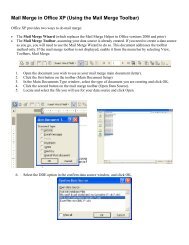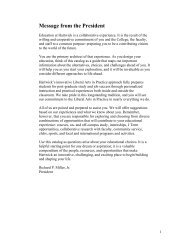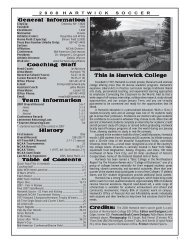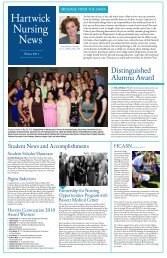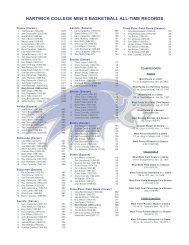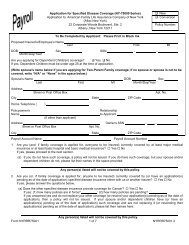Table of Contents - Hartwick College
Table of Contents - Hartwick College
Table of Contents - Hartwick College
You also want an ePaper? Increase the reach of your titles
YUMPU automatically turns print PDFs into web optimized ePapers that Google loves.
150 hour licensure requirement is effective in August 2009. Accordingly,<br />
students selecting the Accounting-CPA major as a path to becoming a<br />
CPA must meet with the Chair <strong>of</strong> the Department <strong>of</strong> Business<br />
Administration and Accounting early in their academic careers to plan<br />
their course <strong>of</strong> study.<br />
The Accounting-General major allows students more flexibility within the<br />
accounting discipline. For example, students can choose courses that<br />
focus on managerial accounting and work toward taking the CMA exam<br />
and becoming pr<strong>of</strong>essional management accountants.<br />
The accounting minor <strong>of</strong>fers advantages to all <strong>Hartwick</strong> students. It is a<br />
natural complement to majors in economics, information science,<br />
business administration, and mathematics, among others. The minor<br />
helps prepare students for careers in business or in organizations that<br />
interact with business. It also provides an excellent foundation in the<br />
language <strong>of</strong> business for students planning to pursue graduate study in<br />
business administration.<br />
A result <strong>of</strong> the interdisciplinary nature <strong>of</strong> the accounting program is the<br />
ease in double-majoring (e.g., accounting and economics, information<br />
science, or business administration) or minoring in a related discipline<br />
(e.g., economics, finance, or business administration). For additional<br />
information, contact the department.<br />
Finance Minor<br />
Careers in finance include corporate finance <strong>of</strong>ficer, stockbroker, portfolio<br />
manager, financial analyst, banker and financial consultant. The three<br />
main areas <strong>of</strong> finance are corporate finance, investments and financial<br />
institutions. The finance minor will provide a foundation in these areas as<br />
well as in the related disciplines <strong>of</strong> accounting and economics.<br />
A focus <strong>of</strong> the minor is corporate finance, which involves decision-making<br />
within a firm. Corporate finance topics include underlying finance theory,<br />
financial analysis and planning, bond and stock valuation, working capital<br />
management, strategic long-term investment and financing decisions, and<br />
international financial management.<br />
The finance minor will be beneficial for a student considering a career as a<br />
pr<strong>of</strong>essional chartered financial analyst. The first <strong>of</strong> three pr<strong>of</strong>essional<br />
exams tests finance, accounting, economics and quantitative methods.<br />
The interdisciplinary finance minor’s courses in finance, accounting, and<br />
economics are a good beginning in preparing for this pr<strong>of</strong>essional exam.<br />
Faculty<br />
Accounting and Finance Faculty: Thomas G. Sears, CPA, chair; Stephen A.<br />
Kolenda, CPA; Priscilla Z. Wightman, CPA<br />
Courses<br />
141 Principles <strong>of</strong> Accounting I (4 credits) The first <strong>of</strong> two courses<br />
designed to provide the fundamentals <strong>of</strong> accounting; focuses on the<br />
28


